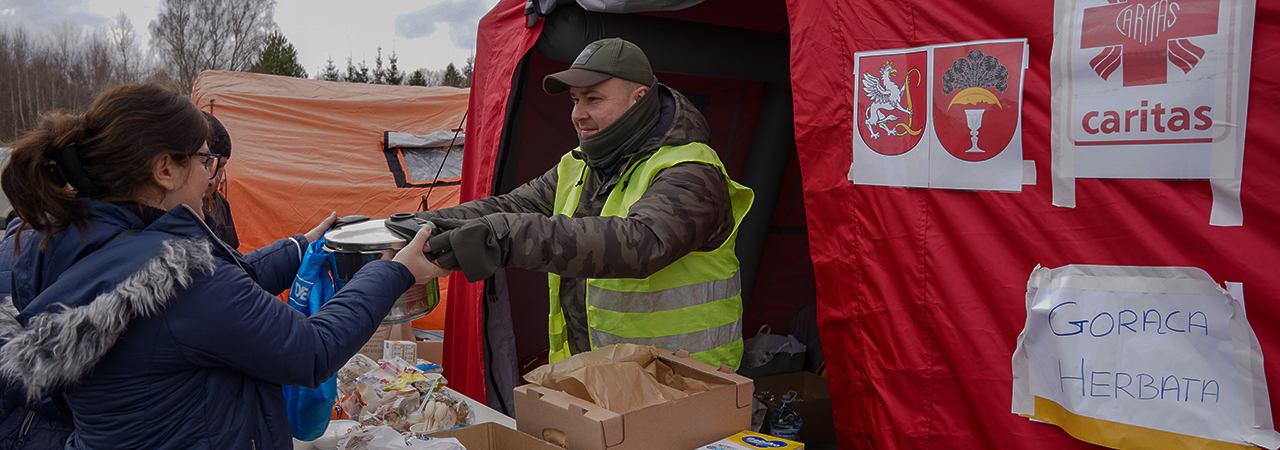

Media CenterAs Ukrainians flee in Unprecedented Numbers, CRS Expands its Humanitarian Response to 10 Countries
FOR IMMEDIATE RELEASE
CONTACT:
Megan Gilbert
Catholic Relief Services
[email protected]
(443) 825-3640
BALTIMORE, MARYLAND, May 5, 2022 – With the United Nations projecting that more than 8 million people will flee the war in Ukraine, Catholic Relief Services (CRS) is expanding its humanitarian response to 10 countries.
“People are still crossing borders into Moldova and surrounding countries, and they still need a hot meal, a place to stay, and information on what services are available to them,” said Conor O’Loughlin, CRS country representative for Moldova and Ukraine. “But at the same time, the people who have been here for months need to start preparing for a longer stay than they had planned. You have millions of new refugees in several different countries and they all need support with housing and other services. It requires the type of large-scale response we are providing.”
The countries where CRS and Caritas are supporting displaced people now include Ukraine, Poland, Hungary, Moldova, Romania, Bulgaria, Croatia, Slovakia, Montenegro and Bosnia and Herzegovina.
“While many families are hoping to be able to return to Ukraine, it’s not safe for them to do so right now,” O’Loughlin said. “That means they have to decide if they are going to remain where they are or move to another country in Europe. And no matter where they decide to stay, they have to find work and figure out where their children will go to school. They have to make those decisions often without their spouses, who remain in Ukraine. The continued stress of these decisions is exhausting.”
Since the war broke out in February, most refugees have been living with relatives or friends or are renting apartments or homes. However, more than three months later, their resources are dwindling. The most vulnerable people are living in collective centers, which are not meant to support families for long-term stays.
“Collective centers play a critical part in giving people a safe place to stay initially, but eventually people want something more like a home, where they have more space and privacy,” O’Loughlin said.
Through rapid assessments and secondary data, CRS determined three areas of need across the region:
- Dignified and financially sustainable accommodation.
- Cash assistance to cover living costs.
- Psychosocial services, including counseling and other support for children and their caregivers.
Based on its assessment data, CRS will continue to provide food and other life-saving essentials, along with cash assistance and counseling to refugee families. In the meantime, to address the longer-term needs, CRS is working with its local Church partners to move families out of collective centers and into separate accommodations. This requires working with local governments to identify people who are willing to open their homes to refugees and providing them with financial assistance for doing so. CRS will also support monthly cash and job assistance programming, where needed. In addition, to prepare for another potential influx of refugees, CRS is working with local governments to preposition relief items such as beds, hygiene kits and food vouchers.
The ability to expand to 10 countries is due to the generous support of donors in the United States, who have given $42 million to CRS’ Ukraine response. The continued work and presence of the Church and Caritas network also makes this large-scale support possible.
“It is in multi-country responses where we see the strength of the Caritas network and benefit from our long-standing partnerships,” said Jennifer Poidatz, CRS’ vice president of humanitarian response. “The existing presence and capacity allow us to quickly scale the response in all countries.”
Still, the number of people needing support and the protracted nature of the crisis highlights how critical it is to provide long-term support to refugees and the local communities.
“Despite the enormous solidarity of individuals and communities, we are starting to see the strain and tension as time passes and the numbers of those in need of support grows and the level of vulnerability of those requiring support also increases,” Poidatz said.
The sudden influx of millions of new refugees in countries in Eastern Europe puts tremendous pressure on governments and local organizations to provide support. The financial burden is significant, particularly in Moldova, which hosts the most Ukrainian refugees per capita.
To adequately address the Ukraine crisis, as well as the secondary impacts of the war on global food insecurity, CRS is urging Congress to pass higher supplemental funding than what has been proposed by the administration.
“As an international leader, the U.S. must break the cycle of panic followed by neglect that we so often see after the initial onset of an emergency. While the war in Ukraine demands our attention, we must not forget the multiple looming hunger crises in places like Yemen, Afghanistan and in the Horn of Africa,” CRS’ statement said.
###
Catholic Relief Services is the official international humanitarian agency of the Catholic community in the United States. The agency alleviates suffering and provides assistance to people in need in more than 100 countries, without regard to race, religion or nationality. CRS’ relief and development work is accomplished through programs of emergency response, HIV, health, agriculture, education, microfinance and peacebuilding. For more information, visit www.crs.org or www.crsespanol.org and follow Catholic Relief Services on social media in English at Facebook, Twitter, Instagram and YouTube; and in Spanish at: Facebook, Twitter and Instagram.
-----------------------------------------------------------------------------------------------------------------------------------------
Online Tools:
CRS Online Press Room: www.crs.org/press-room




